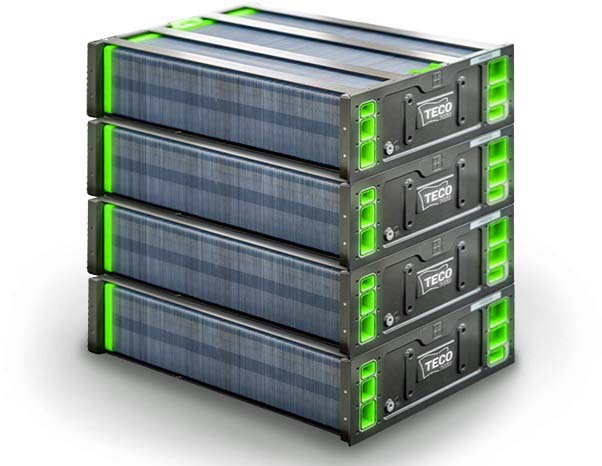Norwegian group TECO2030 has issued an operational update about the developments of Marine Fuel Cells, having reached milestones in both technology and production development.
2021 saw several interesting zero emission fuel cell projects, with development progressing according to schedule, and the first fuel cell modules due to be deployed in a demonstrator project of a zero-emission construction site with Implenia Norway during the summer of 2023. This project has been funded by the state enterprise ENOVA.
The fuel cell has performed several thousands of hours on partner company AVL’s test bench and has outperformed expectations. Several of the components have been through detailed evaluation, simulation, and selection.
The project for the Port of Narvik is awaiting feedback from ENOVA. The Port of Narvik is seeking a high-speed zero-emission hydrogen fuel cell workboat, for which fuel cells of total 1.6MW will be delivered during 2023, pending financing. This will be the first vessel to demonstrate and pilot a TECO2030 FCC1600 onboard. The first fuel cells and prototypes will be delivered to customers during second and third quarter 2023.
Other promising projects are of various sizes, and include Green Hydrogen @ Blue Danube which is currently waiting for an answer on its IPCEI application. The company is in no doubt that renewable energy will play a key role in decarbonising heavy duty and marine applications and is positioning itself to be a key player in the hydrogen field.
The EU recently launched its ‘REPowerEU’ initiative after the ongoing sanctions with Russia were enforced. The European Commission unveiled proposals to further boost renewables and quadruple current 2030 targets for green hydrogen supplies as part of a hastily assembled strategy to cut the EU’s reliance on Russian gas by two-thirds as soon as the end of this year. This will spark a boost in the European hydrogen industry and leads to higher reliance of hydrogen fuel cells in the years to come.
Development of the fuel cell production facility in Narvik started in early December 2021, with the first employees there working alongside the Lysaker HQ and AVL’s production planning engineers. In conjunction with building and equipping the production facility, several certification processes are being worked on, such as ISO-certifications and RamBase Technology implementation.
TECO2030 is now aiming to achieve 1.6GW of annual PEM fuel cell production at Narvik by 2030. The increased production capacity is in line with the market demands and the EC ‘REPowerEU’ initiative. TECO2030 has signed a strategic cooperation agreement with Al Misehal Group in Saudi Arabia, aiming to achieve net zero by 2060. The TECO2030 and Al-Misehal cooperation aims to be a leading supplier of zero emission hydrogen-based fuel cells in the region.
Group CEO Tore Enger said: “We are currently in a good position to deliver PEM fuel cells to the maritime and heavy-duty industry, and the interest among clients is high. Currently I would estimate that we are involved in 65 fuel cell projects in all sizes and appropriate stock exchange notices will be given when ready for launch. The current market situation for hydrogen is accelerating from the hype stage we saw a couple years ago, to the take-action stage we are now experiencing. The future will include hydrogen as an energy source, and we are striving daily to deliver world-class fuel cell systems to our clients.”



